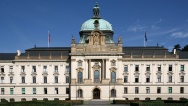Press Advisories
31. 3. 2016 18:39
Prime Minister Bohuslav Sobotka’s speech at the Brookings Institution
Speech by Prime Minister at the Brookings Institution
Ladies and Gentlemen,
A year and four months ago, I had the honour, at the Capitol Building, to unveil a bust of Václav Havel, who symbolises the fall of communism and the establishment of a free and democratic society in our country. In the speech I gave at the time, there were several points where I quoted the famous address he delivered to both Houses of the United States Congress in February 1990. I am sure that you will not hold it against me if I draw on that speech by the Czechoslovak – and subsequently Czech – President for some degree of inspiration once again today.
Havel spoke to Congress about his vision for a Europe built on universal respect for human rights, genuine political pluralism and freedom of choice. He pictured a Europe where state borders would play an ever decreasing role until they disappeared altogether. This vision started to come to successful fruition in the autumn of his life. Stability prevails not only in Central and Eastern Europe, but also in the Western Balkans, which had been a theatre of bloody conflict back in the 1990s. The Schengen Area, guaranteeing movement free of border controls, now encompasses 26 European countries.
Sadly, as I have previously noted, all of these achievements have come at a cost, the full effects of which we have witnessed recently. Today, Europe is grappling with turmoil on numerous fronts – we’ve had the Greek debt crisis, there’s been the illegal annexation of Crimea and military destabilisation of eastern Ukraine, the civil war in Syria, the Islamic State, the terrorism this has triggered, and the migration and refugee crisis. Needless to say, all of this has played a decisive role in our thinking and in the political lie of the land in Europe, yet it is not the biggest problem we face. The main issues are the state of quasi-permanent crisis management, the feeling that we do not have circumstances under control, and Europe’s very frequent inability to stick to its own rules.
Legions of Europeans today are frustrated and afraid of how events will play out, nationalistic tendencies are mushrooming and there are increasing calls for radical solutions. This has opened the door to dangerous radicals in numerous parliaments and has intensified debate on the disintegration and loosening of the European Union. The most glaring example of this is the possibility that the UK will exit the Union. If it does, this could be a turning point in the way European cooperation has developed in the wake of the Second World War. Europe’s internal cohesion – built on the basis of highly complex blueprints and negotiations since the 1950s and capped by the European Union’s enlargement to embrace the states of the former Eastern Bloc (including the Czech Republic) – is at stake.
Today, no European country is in a position to weather the challenges and tasks before us successfully, and no European country has the wherewithal to do so in isolation. We live in an entangled world and, if we do not wish Europe to be sidelined, we must remain in each other’s company. With this in mind, the Czech Government espouses the idea of European integration and intensifying cooperation within the European Union. In the face of the challenges I have spelt out, pan-European cooperation offers the only path forward, which I believe is leading us to stability, prosperity, the defence of Europe’s place in the world, and the upholding of those values on which our civilisation stands.
Ladies and Gentlemen,
The Brookings Institution is celebrating its 100th anniversary this year. In that 100 years, you have become one of the most esteemed think tanks in and beyond the United States. Among you, there are experts in all fields of the life of today’s society, which has changed completely since you came into being and will continue to evolve in the future. Many of you specialise in foreign relations and are bound to know more than I about the causes of the events affecting the world today. In this light, I feel it will not hurt if, rather than lecturing you on facts and figures and individual events, I will focus instead on what I, as the prime minister of a country with a population of 10 million in the heart of Europe, consider to be key areas requiring our attention.
If we are to end the chaos of migration in Europe, we must restore the European Union’s effective and functioning external border protection, and also stabilise the regions in the EU’s immediate vicinity. In doing so, we must not lose sight of the humanitarian aspect of the current situation, in which a whole barrage of people heading for the European Union are fleeing war and terror to save their skins; these are people we are duty-bound to assist. Europe needs to be more decisive and show itself to be more capable of action. We need to take on board that if we in Europe do not become successfully involved ourselves, no one else is going to do it for us. We also need to be candid when it comes to naming the problems that have often been sparked by uncontrolled integration when past waves of immigrants from a Muslim background have rolled into mainstream European society. Candour is the first step in reaching any realistic solution.
Today’s migration crisis is primarily rooted in states that have been destabilised and rent asunder by war, where their own citizens have been dispossessed of any prospects in life. If we are to come to grips with the migration crisis, our priority challenge must be to bring peace to countries such as Syria, Libya and Iraq, and subsequently to regenerate them economically and socially.
Cooperation with countries directly in the crisis regions is also crucial. The Czech Republic – as the country currently holding the presidency of the Visegrad Group (the other members of which are Poland, Slovakia and Hungary) – is waging an intensive campaign to increase the assistance given to those countries hardest hit by the refugee crisis. Our focus is both on Europe, particularly Macedonia and Greece, and on the Middle East, where most of our aid is being channelled into Turkey, Jordan and Lebanon. From the point of view of the Czech Republic, nor is the assistance we are providing on the ground in Syria negligible. The Czech Republic is the only EU Member State to maintain a functioning embassy in Damascus. The contacts we have established here are of immense value for our allies and help to improve the way humanitarian aid is organised in war-ravaged areas. I am pleased that the Czech Republic, capitalising on its past experience and position in the middle of Europe, is today signalling loud and clear that it is keen to play an important and constructive role in the process of European integration and in the provision of greater security in Europe.
I think you will agree with me that, in uncertain times such as these today, we should cement our alliance with those who share not only our common objectives, but also – and more importantly – our social values. Hence, in my view, one of the top priorities that Europe needs to pursue is the cultivation and intensification of the transatlantic relationship and cooperation within NATO. For me, Europe’s security architecture would be inconceivable without the North Atlantic Alliance. The strategic partnership between the EU and the US must be deepened and should even reach into other areas of policy beyond defence and security. I see the negotiations on the Transatlantic Trade and Investment Partnership as corroboration of the importance of these mutual relations. I am confident that, despite our differing interests, we will soon arrive at a balanced text that will work for both sides, and that a deal will be done.
Nevertheless, it holds true even here that our transatlantic alliance is something we often tend to take for granted, as something that will automatically go on into the future. I would argue that this is shortsighted and potentially dangerous. Voices questioning the transatlantic partnership can be heard on both shores of the Atlantic. I believe that we need to invest in this cooperation by spending political capital and, in particular, by strengthening ties between ordinary Europeans and ordinary Americans. In this respect, we need to make people interested in what is happening on both sides of the Atlantic and make them more willing to listen to each other and recognise the relevance of an Atlantic partnership. This is one of the reasons why I have come to visit the United States now.
Ladies and Gentlemen,
I would like to close by thanking you for your invitation. It is an honour for me to speak here at such a significant organisation. I would like to congratulate you on your anniversary and wish you at least another hundred years of work driven by your quality, independence and impact.
Thank you for your attention.






